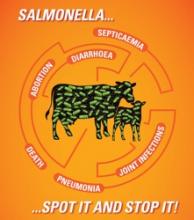Outbreaks of Salmonella can be devastating in cattle herds such is the potential scale and severity of an infection. They are also a risk to people and outbreaks can have serious public health implications.
The signs of Salmonella infection are varied and the same as those caused by many other diseases, so it is vital to contact the practice if you spot any of them, particularly: diarrhoea, abortion, blood poisoning, joint infections, pneumonia, milk drop and death.
They may affect any age, from young calves to adults so keep Salmonella in mind when you spot signs in all age groups.
Diagnostic testing
It is important to involve the practice, as a quick diagnosis can limit the damaging effects to your herd, saving time, money and can reduce animal suffering
Depending on the signs of disease shown, different samples may be taken and sent to the laboratory to help get a diagnosis. Post mortems are very valuable, as are scour samples and analysis of aborted material.
Biosecurity
Salmonella bacteria are shed in faeces with times of stress, such as calving and transport - triggering a spread of infection from carrier animals. Salmonella can be introduced to a farm by replacement stock, birds or rodents, feedstuffs or watercourses, muck or slurry, and even on clothing or vehicles.
Checking the health status of source farms when buying in stock is critical, whilst other aspects of biosecurity should also apply, including quarantine and stringent hygiene on farm.
Vaccination
Prevention is much more effective than an attempted cure with Salmonella, therefore vaccination is an important part of an overall herd management programme. Speak to one of our vets and ask us what’s best for your herd.
Getting started with vaccination is simple with a 2 dose primary course, followed by a single dose annual booster, essential to maintain continuous protection.
Salmonella is not going away any time soon, but the good news is that you can take many steps to reduce the risks of disease outbreaks.
Contact the practice to make sure you have the right plan in place to protect your stock, your farm workers and yourself - 01363 772860.


